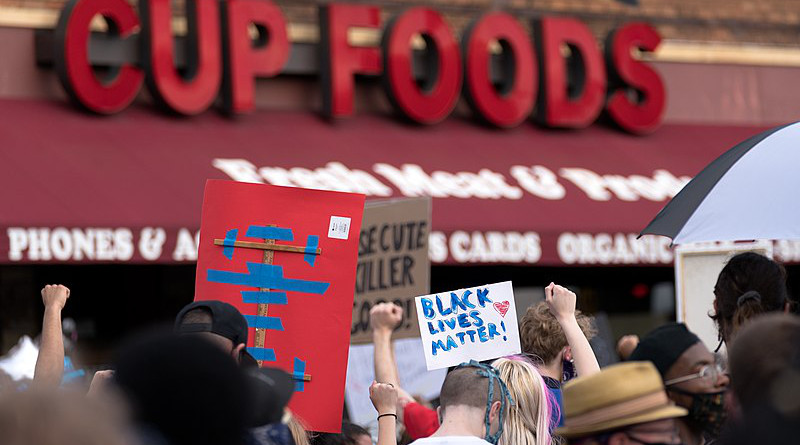George Floyd Protests: Sense Of Community Could Help Heal US’ Scars – OpEd
By Arab News
By Cornelia Meyer*
After George Floyd died last week at the hands of a police officer, what ensued was dramatic and dangerous. Demonstrators took to the streets across all metropolises in the US.
As many protests turned violent, President Donald Trump wanted to invoke the Insurrection Act of 1807 and draft the army to quell the unrest. This met with bipartisan opposition. It is unclear whether the president has the right to deploy troops without the invitation of a state governor. Texas Governor Greg Abbott (a Republican) proclaimed that “Texans can take care of Texans,” while New York State Attorney General Letitia James (a Democrat) responded to Trump by saying that he “does not have the right to unilaterally deploy US military across American states.”
Virtually all mayors have condemned the violence, none more so than Atlanta’s Keisha Lance Bottoms, a Democrat and African-American herself. She told violent demonstrators in an impassioned address that this was not who they wanted to be and appealed to their better selves. Former President Barack Obama joined the debate, writing on Medium: “Let’s not excuse violence, or rationalize it, or participate in it. If we want our criminal justice system, and American society at large, to operate on a higher ethical code, then we have to model that code ourselves.”
Trump’s photo calls at St. John’s Episcopal Church and Saint John Paul II National Shrine drew criticism from both an Episcopal bishop and the Catholic archbishop of Washington. The first of these poured oil on the fire as riot police used force to clear peaceful demonstrators from Lafayette Square to allow the president to cross from the White House to St. John’s.
Some have compared the current situation to 1968, and there are similarities. In 1968, Apollo 8 became the first manned spacecraft to orbit the moon. In 2020, America’s first manned spacecraft in nine years took three astronauts to the International Space Station. In 1968, riots erupted across the country as a response to the assassination of civil rights leader Martin Luther King. Now we have seen what has happened over the last few days.
That is where the similarities end. In 1968, then-President Lyndon B. Johnson heeded the message and signed the Civil Rights Act into law. This year, African-Americans again have every right to be angry. Police brutality doesn’t seem to be abating. It is as though America has not moved forward from 1992, when riots broke out in Los Angeles after police officers were acquitted over the beating of Rodney King. A slew of cases involving excess police force against African-Americans has followed.
African-Americans and some other ethnic minorities have been disproportionately affected by the coronavirus disease. They also hold many of the low-paying jobs in the hospitality and other industries that have been particularly hard-hit by the economic downturn. Many of them do not know whether they will ever have a job to go back to. Many African-Americans feel that, as a group, they have been left out of a decade of economic growth and that, 52 years after King’s death, little has changed as far as their position in society is concerned.
They are right to feel angry. But, as Obama and Lance Bottoms rightly said, violence is not the answer. Obama feels that the way to address police brutality is intervention at the local level with elections and the supervision of police forces.
In 1968, like now, we have a presidential race. Johnson put his re-election into question by forcefully pushing for the Civil Rights Act, putting country before self. Trump was probably looking at history when he declared himself the “president of law and order,” but his attempts to do so seem to have backfired — and not just with the left. Pentagon officials have criticized the potential deployment of the military on the streets. Meanwhile, in response to Secretary of Defense Mark Esper calling the country a “battle space,” former Chairman of the Joint Chiefs of Staff Gen. Martin Dempsey tweeted: “America is not a battleground. Our fellow citizens are not the enemy.”
On Tuesday, Democratic presidential candidate Joe Biden gave a passionate speech, in which he said: “I won’t traffic in fear and division. I won’t fan the flames of hate.” He went on to describe “the America of (former presidents) FDR (Franklin D. Roosevelt) and (Dwight) Eisenhower, of Rosa Parks and Martin Luther King.” It seemed as though, in the face of adversity, Biden had found his voice.
The question remains, what are we going to be left with once the spotlight stops shining on this issue? America still seems to have an uneasy relationship with race, 57 years after King told the nation he had a dream, and despite eight years of an African-American holding the presidency.
But the question is bigger than who sits in the White House, in spite of presidents setting the tone. During the 2000s, the author of this column lived for several years in Atlanta, and then some time in Dallas. What was striking to me, as a foreigner, was the lack of a sense of community in both cities. People felt that they belonged to their ethnic group or socioeconomic status, but did not really see the whole population of the city as their community. One can argue that it is hard to build a sense of community in a society as transient as America’s. However, the scars laid bare over the last week can only heal when people are prepared to reach across the divide and see members of other groups as part of their bigger community. That is precisely why Obama was onto something when he said solving these problems should start at the local level.
- Cornelia Meyer is a business consultant, macro-economist and energy expert. Twitter: @MeyerResources

